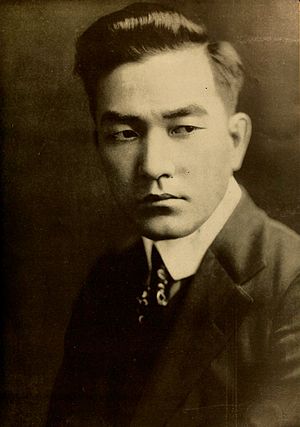Sessue Hayakawa (早川 雪洲, Hayakawa Sesshū, June 10, 1889 – November 23, 1973) was a Japanese and American Issei actor who starred in American, Japanese, French, German, and British films. Hayakawa was active at the outset of the American film industry. He was the first and remains one of the few Asian actors to find stardom in the United States and Europe. He is the first Asian American as well as the first Japanese American movie star and the first Asian-American Leading Man. His "broodingly handsome" good looks and typecasting as a sinister villain with sexual dominance made him a heartthrob among American women, and the first male sex symbol of Hollywood, several years in advance of Rudolph Valentino. During those early years, Hayakawa was as well known and as popular as Charlie Chaplin and Douglas Fairbanks, although today his name is largely unknown to the public.His popularity, sex appeal, and extravagant lifestyle (e.g., his wild parties and his gold-plated Pierce-Arrow) may have fed tension within segments of American society and led to discriminatory stereotypes and the desexualization of Asian men in American productions, something that continues to today in Modern Hollywood, as exemplified by the controversial character of I.Y. Yunioshi in Breakfast At Tiffany's. Hayakawa refused to adopt the negative stereotypes. He abandoned Hollywood for European cinema and there he was treated equally. Hayakawa's friendships with American actors led him to return to Hollywood. He was one of the highest paid stars of his time, earning $5,000 per week in 1915, and $2 million per year through his own production company during the 1920s. He starred in over eighty movies, and two of his films stand in the U.S. National Film Registry.Of his English-language films, Hayakawa is probably best known for his role as Colonel Saito in the film The Bridge on the River Kwai, for which he received a nomination for Academy Award for Best Supporting Actor in 1957. He also appeared in the 1950 film Three Came Home and as the pirate leader in Disney's Swiss Family Robinson in 1960.In addition to his film acting career, Hayakawa was a theatre actor, film and theatre producer, film director, screenwriter, novelist, martial artist, member of the French Resistance, and a Zen master.

Fin de la actividad (año)
1966
Fecha de nacimiento
1889-06-10
Nombre de nacimiento
Kintarō Hayakawa
早川金太郎
Año de nacimiento
1889
Fecha de defunción
1973-11-23
Año de defunción
1973



Aipatu
0